|

|
October 15, 2010
Posted: 1516 GMT
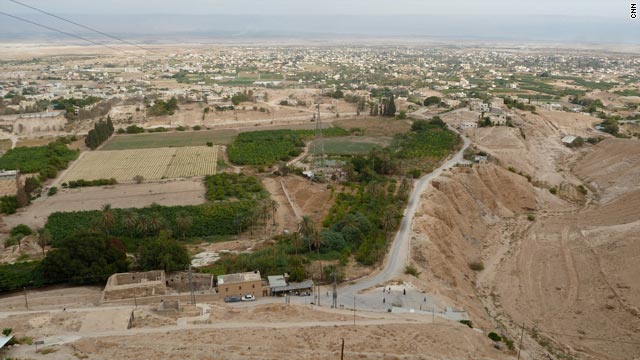 A view of the West Bank city of Jericho. Editor's note: For more on this story tune in to the next Inside the Middle East show on Wednesday 3 November. Go to the showpage for more detailed showtimes. Everyone loves a good birthday party until they reach an age when they’d rather forget. For the West Bank city of Jericho it’s a birthday to be proud of, a milestone no other city in the world has celebrated - 10,000 years . An eight-meter tower with the world’s oldest known staircase descends from the top - 22 steep, well-worn steps to a tunnel below. Posted by: CNN Correspondent, Paula Hancocks
September 27, 2010
Posted: 1953 GMT
CNN's Nic Robertson travelled to Damascus this past weekend for a sit-down interview with Hamas leader-in-exile Khaled Meshaal. You can watch portions of the interview here and here or read the transcript after the jump. Among other things Meshaal talks about why he believes why the current negotiations between Israelis and Palestinians are a "trick" that will fail, why he thinks Hamas is justified staging attacks against Israelis, and comments on the status of captured Israeli soldier, Gilad Shalit, captured by Hamas and other Gaza based militants groups in a 2006 cross-border raid. Transcript starts here: Posted by: IME blog producer
September 17, 2010
Posted: 1305 GMT
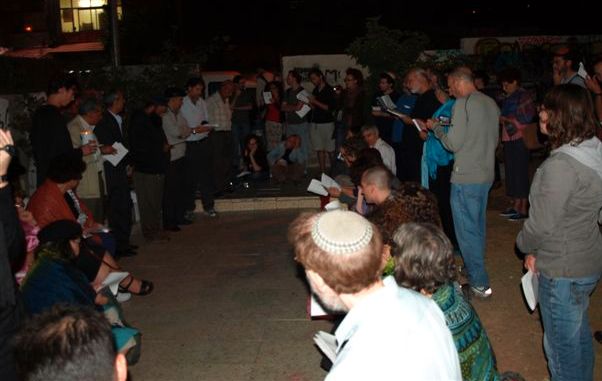 Prayer vigil among Israelis and Palestinians in East Jerusalem (Kareem Khadder/CNN) Dozens of secular Israeli Jews and religious activists stood silently in the Palestinian neighbourhood of Sheikh Jarrah in East Jerusalem. It's just before Yom Kippur and they have gathered in a display of solidarity with Palestinian residents who have been evicted from their homes by the Israeli government. The neighbourhood of Sheikh Jarrah has become one of the latest fault lines in the decades old conflict between Israelis and Palestinians over land. In the past few years, dozens of Palestinians from three families, who have lived in the area since the 1950's, have lost their homes in court battles to Jewish Israelis who claimed the land was owned by them before the creation of Israel in 1948. The evictions have given rise to a weekly protest movement in Sheikh Jarrah aligning leftist Israelis, international activists and local Palestinian residents. Activist Rabbi Arik Asherman, from an organization called Rabbis for Human Rights, says Isareli Jews have come together this night ahead of Yom Kippur to recite prayers asking for forgiveness. Forgiveness, for what he says, is the injustice being carried out by the Israeli state against the Palestinian residents of the neighbourhood. "...there are families who are not at their homes because the court did not review the evidence in the courts when expelling the families and that the Israeli legal system has sanctioned the expulsion based on suspect pre 1948 Jewish claims, while denying the expelled Palestinian families an equal opportunity to re-claim their 1948 homes in Israel proper. The Jewish tradition calls that eifah v'eifah, a double standard," Palestinian residents of the neighbourhood took part in the evening observance and recited hymns and prayers with their Jewish supporters. One Palestinian resident of the neighbourhood who had been evicted from his home, Maher Hanoun, said he appreciated the presence of the Israelis in supporting Palestinian claims on their homes. Rabbi Asherman said the theme of the evening was taken from the poem "On the Day of Atonement" written by famed Israeli poet Yehuda Amichai in which an Israeli Jew engages in a silent conversation with an Arab shopkeeper in Jerusalem's Old City. Posted by: IME blog producer
September 1, 2010
Posted: 2003 GMT
 Holocaust survivor Elie Wiesel speaks at the White House after having lunch with US President Barack Obama in Washington, DC, May 4, 2010 (JIM WATSON/AFP/Getty Images) Nobel Peace Prize winner Elie Wiesel is highly optimistic about the outcome of the Washington summit, despite popular cynicism surrounding yet another attempt at Middle East peacemaking. Wiesel, the 1986 recipient of the Peace Prize and author who has chronicled humanity's darker side, spoke about the U.S. effort to launch direct talks between Israel and the Palestinian Authority on the sidelines of a conference he was attending in Jerusalem. Wiesel told CNN: "President Obama, the initiator of this noble endeavor, he would not have done it had there been no indication, the kind of indication from all parts, all segments of the equation that something is about to happen." All the parties coming to Washington must see some light at the end of the tunnel to take this kind of gamble, he said, asking rhetorically: "Why meet, to have another failure at home and abroad in the world? It makes no sense." Wiesel also believes that both sides are now in a state of war fatigue. "I have a feeling here everybody is tired... too much war, too much violence, too much suffering, too much pain, too much death, and therefore I think that this time we are on the right way," he said. Read the rest of this entry » Posted by: Izzy Lemberg
August 21, 2010
Posted: 2003 GMT
After months of tense relations with Israel's right-wing coalition government led by Prime Minister Benjamin Netanyahu and a great deal of pressure being placed on President Mahmoud Abbas and his Palestinian Authority, the Obama administration marked one of its first Middle East diplomatic successes this past week with the announcement that Israeli and Palestinians would resume direct negotiations starting in September in Washington. Expectations, however, are not high and the one-year time frame for the talks to achieve a workable agreement is considered overly optimistic by some. But despite the doubts, getting the two sides speaking again is being heralded by the American government as an important first step. Our Jerusalem correspondent explains here what exactly is at stake in these talks. Filed under: General •Israel •Jerusalem •Palestinians
March 29, 2010
Posted: 915 GMT
By the CNN Wire Staff Jerusalem (CNN) - Israeli security forces said they will close the West Bank region from midnight Sunday to Tuesday, April 6. 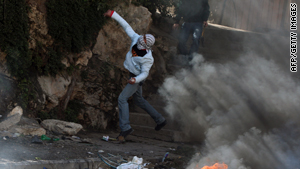
A Palestinian youth hurls stones at Israeli soldiers at the West Bank refugee camp of Qalandia on Thursday.
Only people who need medical attention and journalists with appropriate credentials will be allowed to cross, the Israel Defense Forces said in a statement. Humanitarians, doctors, lawyers and other professionals will also have access based on approval by the civil administration. About 1,250 religious workers, along with 550 students and teachers, have permission to leave Judea and Samaria, the IDF said. Israeli Defense Minister Ehud Barak ordered the closure during the Passover holiday. The measure was enacted "following situation assessments adopted by the defense establishment," the statement said. Filed under: Israel •Jerusalem •Palestinians
March 23, 2010
Posted: 1007 GMT
Washington (CNN) – Israeli Prime Minister Benjamin Netanyahu on Monday sharply defended his government's plan to build new housing on disputed land in East Jerusalem, a decision that has put Israel at odds with its leading ally. 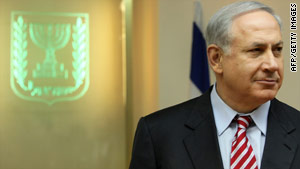
Israeli Prime Minister Benjamin Netanyahu is scheduled to see President Obama on Tuesday at the White House.
In a defiant speech to the leading pro-Israel lobby in the United States, Netanyahu said Jewish neighborhoods in East Jerusalem are "an integral and inextricable part of modern Jerusalem." "The connection between the Jewish people and Jerusalem cannot be denied," Netanyahu said to prolonged applause. "The Jewish people were building Jerusalem 3,000 years ago, and the Jewish people are building Jerusalem today. Jerusalem is not a settlement. It is our capital." Netanyahu's Monday night speech to the U.S.-Israel Public Affairs Committee came nearly two weeks after Israel announced the planned construction of 1,600 new housing units in a disputed area claimed by both Israelis and Palestinians. That announcement came during U.S. Vice President Joe Biden's visit to Israel and has strained ties between Netanyahu's government and the Obama administration, which is pushing for new talks to end the decades-old Israeli-Palestinian conflict. But Netanyahu said his government's policies are in line with those of previous Israeli administrations, and that nearly half of Jerusalem's Jewish population now lives in East Jerusalem, which Israel has occupied since 1967. Read full story... Filed under: Israel •Jerusalem •Palestinians •U.S.
March 17, 2010
Posted: 514 GMT
February 12, 2010
Posted: 539 GMT
By CNN's Kevin Flower Read more on the Inside the Middle East website. Jerusalem (CNN) - Archaeologists working under the direction of the Israeli Antiquities Authority have uncovered a 1,500-year-old road running through the center of Jerusalem's Old City. 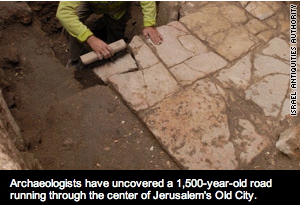
Excavation director Dr. Ofer Sion said the discovery lends further credence to the accuracy of what is known as the Madaba Map - a Byzantine period mosaic map of the Holy Land that depicts an entrance into Jerusalem that leads to a single central street. Archaeologists working in Jerusalem have made various finds to suggest the Madaba map was geographically correct, but the road depicted in the mosaic had not been found. "It is proof of this beautiful map and for this street from the Byzantine period," Sion told reporters at the dig location. The ancient road was found near the Jaffa Gate of Jerusalem's Old City 4.5 meters under current street level when municipality workers initiated an infrastructure improvement project. The road dates from the period when Jerusalem was under Christian control and was constructed with large flagstones of more than a meter in length. The road connected the western wall of the city to the eastern side of Jerusalem, Sion said. When the street was in use according to Sion, "hundreds of thousands of people are reaching the city, pilgrims from all over the world, and they are coming to Jerusalem and entering through the gate and going down the center, to the market of the city. They are going down in this street." Next to the road archaeologists also discovered a stone foundation which supported a sidewalk and a row of columns. "It is wonderful to see that David Street, which is teeming with so much life today, actually preserved the route of the noisy street from 1,500 years ago," Sion said. Other artifacts discovered in the excavation included coins, pottery vessels, and five bronze weights that are believed to have been used by merchants for weighing precious metals. The Madaba map, is a large 8 X 16 meter mosaic located in the apse of the church of Saint George in Madaba, Jordan. It is the oldest known cartographic representation of the Holy Land and at its center is a detailed depiction of Jerusalem in the sixth century AD. The mosaic has served as a guide to historians and archaeologists to what Byzantine period Jerusalem may have looked like and depicts many landmarks that survive until this day including the Church of the Holy Sepulchre and Damascus Gate. Filed under: Archaeology •Jerusalem
December 21, 2009
Posted: 840 GMT
|
This blog has now been archived and commenting has been switched off. Visit the Inside the Middle East site for news, views and video from across the region. Read more about CNN's special reports policy Categories
Archive
|